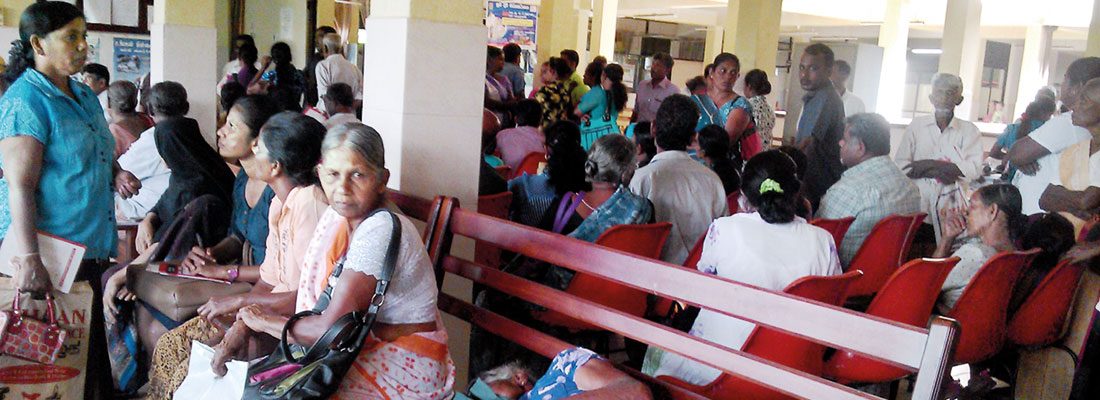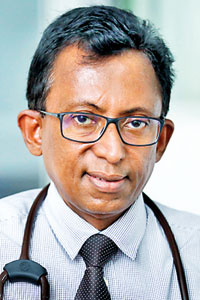News
Expert lays down clear strategy to pull Lanka back from viral illness chaos
View(s):By Kumudini Hettiarachchi
Tell the people the unvarnished truth so that they can safeguard themselves—this is the dire need as Sri Lanka grapples with various viruses, some borne by mosquitoes and others with respiratory transmission.
This is the urgent appeal going out from Consultant Paediatrician Dr. LakKumar Fernando, former head of the Centre for Clinical Management of Dengue Fever and Dengue Haemorrhagic Fever in Negombo. He was instrumental in changing the clinical management of deadly dengue to drastically reduce those succumbing to this mosquito-borne viral illness.

Several viral diseases, including COVID-19, dengue, and chikungunya, are spreading across the Western Provinces
“What is the ground reality?” asks Dr. Fernando, reiterating that people need to be told that COVID-19 is resurfacing across the country. “Yes, COVID-19 is back, but there is absolutely no need to panic,” he says, underscoring that people also need to be armed with knowledge on how to prevent catching these illnesses, but if they do, what steps should be taken to prevent descending into severe illness.
The viruses doing the rounds in the Western Province are aplenty, he says, zeroing in on dengue and chikungunya, which have become common, and COVID-19 “once again becoming a little more common”.

Dr. LakKumar Fernando
Delving into fevers affecting those in urban areas, he says that they “do not readily show the settling trend” by 3-4 days. These fevers could also indicate that the sufferers may be positive for COVID-19. He estimates that 5-15% of suspected viral fevers that do not test positive for dengue or influenza (when tested within the sensitive window) and have respiratory symptoms plus fever, even if mild, may be positive for COVID-19 in the Western Province.
With his wide experience as a clinician, Dr. Fernando sets out a possible strategy to pull Sri Lanka back from this period of critical illness.
People should be told through strong public awareness campaigns that ‘COVID-19 is back’, but there is no cause for alarm and panic.
Thereafter, respiratory etiquette should be reinforced with constant media campaigns, not as a panic response but as a preventive measure. The message that has to be reinforced is that preventing a COVID-19 outbreak is not only beneficial to families and communities but also to the country which is facing huge economic issues.
The training of healthcare workers on safety precautions should be refreshed.
Once the tests (see box) are performed, three categories of patients would be identified from the COVID-19 positive cases—those very mildly symptomatic, who would be the large majority; those with substantial co-morbidities and/or moderate symptoms; and those with severe illness requiring aggressive care or Intensive Care Unit (ICU) treatment.
Dr. Fernando says that a majority would fall into the ‘mildly symptomatic category’, and as done in the latter stages of the pandemic, they may be managed at home. If, when testing is done, the patient is already in hospital, he/she should be discharged as soon as possible with a hospital contact phone number or hotline number for guidance at home. If they refuse to go home, separate housing with minimal medical amenities, basic necessities and frequent visits from doctors, both in the public and private sectors, until they are able to return home, should be made available.
Dealing with the second category of ‘those with substantial comorbidities and/or moderate symptoms’, he says that if they are kept in hospital, the illness would spread and disrupt the hospital system by infecting healthcare workers and other patients. Some hospitals could be identified to set up dedicated COVID-19 wards, with other hospitals transferring patients there for additional care. These COVID-19 wards should have oxygen and some monitoring to identify and treat worsening cases.
The final category of ‘those with severe illness’, he says, would need care at specialised hospitals such as the National Institute of Infectious Diseases (NIID).
With regard to lowering morbidity (illness) and mortality (death), Dr. Fernando says there are a number of effective medications (such as antivirals), both intravenous and oral, that can be used to treat COVID-19. These medications, in use throughout the world, should be registered with the National Medicines Regulatory Authority (NMRA) through the fast track and made available speedily, following due process, through private agents or the State Pharmaceutical Corporation (SPC).
| Accurate data, a must Do we know the status of the viral disease situation in Sri Lanka, asks Dr. LakKumar Fernando, underscoring the need to get accurate estimates before deciding on specific measures. The “only way” to determine the extent of illness is by increasing testing—mainly Rapid Antigen Testing (RAT), some Polymerase Chain Reaction (PCR) testing, and also some sequencing to find out what variants are doing the rounds, he says, pointing out that there should be a plan in place for those who test positive for COVID-19 before requesting more testing. He moves on to the ‘optimal’ time for testing, giving his experiences as a dengue expert. The protocol he follows is:
|
The best way to say that you found the home of your dreams is by finding it on Hitad.lk. We have listings for apartments for sale or rent in Sri Lanka, no matter what locale you're looking for! Whether you live in Colombo, Galle, Kandy, Matara, Jaffna and more - we've got them all!

